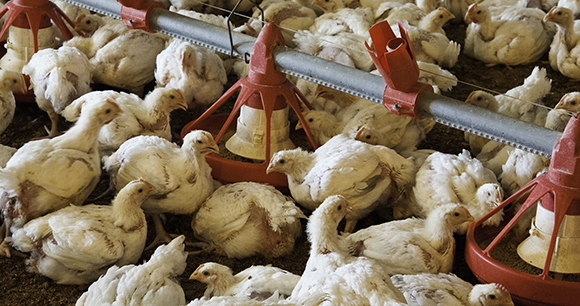
Analysis highlights need for USDA to require humane handling of birds at slaughter
Washington, DC—The Animal Welfare Institute (AWI) today released a new report describing the poultry industry’s level of compliance with humane handling regulations and guidelines. The report covers activities related to the treatment of chickens and turkeys at the approximately 300 federally inspected poultry slaughter establishments in the United States for the period 2015-2016.
AWI’s investigation found that poultry slaughter plants received, on average, 2–3 records for noncompliance with “good commercial practices” during the two-year period. The number of records for individual plants varied greatly, however. While nearly half of all plants received no records at all, five plants were issued between 20 and 40 records each.
“Our review of USDA records shows a clear pattern of animal mistreatment at individual poultry slaughter plants, said Dena Jones, AWI farm animal program director. “Several recent undercover investigations by animal protection advocates have documented the same type of mistreatment described in the USDA records, lending credence to the possibility that abuse is common practice at some plants.”
According to documents obtained by AWI through the Freedom of Information Act, the following chicken plants were each cited at least 20 times for not complying with humane handling standards:
- Simmons Prepared Foods in Decatur, Arkansas
- Case Farms Processing in Morganton, North Carolina
- Pilgrim’s Pride in Mount Pleasant, Texas
- Case Farms of Ohio in Winesburg, Ohio
- Sanderson Farms in Palestine, Texas
AWI also found that, during the two-year period, turkey slaughter plants in the United States were issued significantly fewer humane handling citations than chicken plants. One possible explanation for this finding is that many turkey plants use gas stunning, which limits the amount of live animal handling by employees. Most chicken plants, on the other hand, use an electrical water-bath stunning system, which involves shackling and hanging of conscious birds.
The turkey slaughter plants that received the most humane handling violations were the Jennie-O Turkey plant in Melrose, Minnesota, and the Turkey Valley Farms plant in Marshall, Minnesota. According to USDA documents, both plants use electrical stunning.
AWI’s analysis found that, between 2015 and 2016, the most commonly cited humane handling problems involved chickens drowning in the scalding tank or the tossing of live chickens in the dead-on-arrival bin. Many of the incidents cited in the records resulted in profound animal suffering. Yet, under current USDA regulations, no enforcement actions are possible in any of these situations, with the exception of multiple birds drowning in the scald tank.
This is because the USDA has decided not to include humane handling requirements in the regulations. As a result, compliance with good commercial practices is only voluntary. The department also has not responded to a petition filed four years ago by AWI and Farm Sanctuary to require humane handling of birds at slaughter.
“USDA inspectors at problem plants have their hands tied due to the lack of humane handling regulations, said Jones. All they can do is continue to write up the plants for failing to comply with industry standards. Until the USDA does its duty as an oversight agency, consumers will have no assurance that poultry are being treated humanely at slaughter in the United States.”
Amey Owen, (202) 446-2128, [email protected]